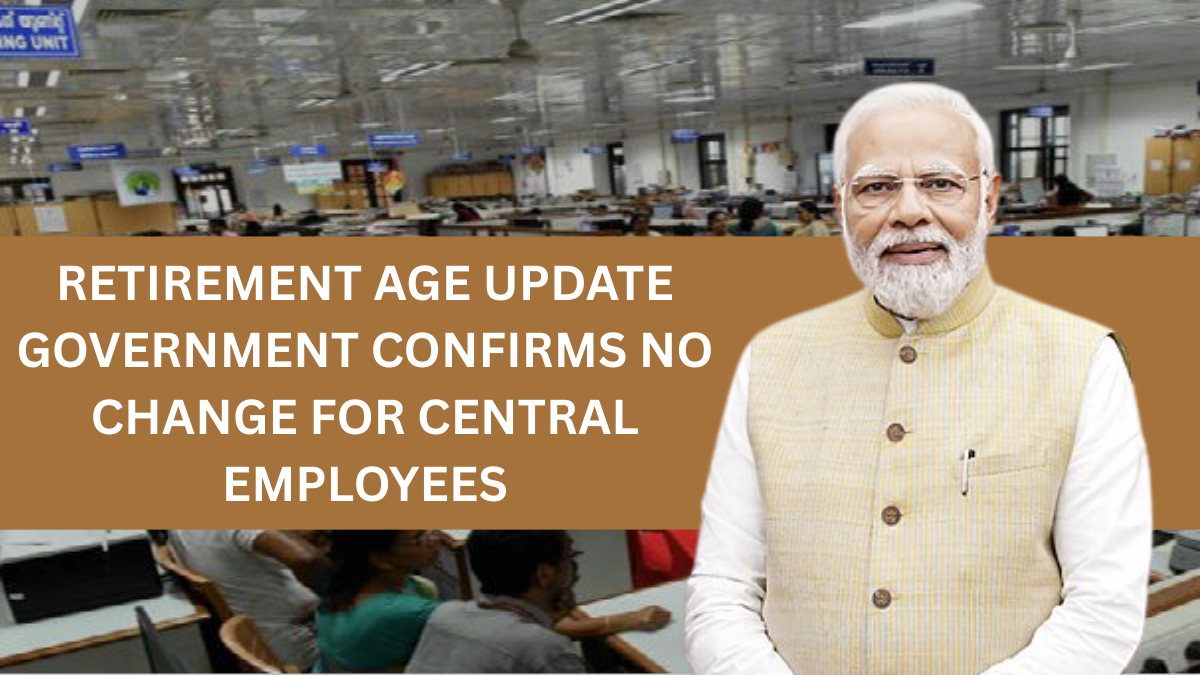For months, rumors have been swirling on social media and WhatsApp groups about a possible retirement age hike for central government employees. Some viral posts even claimed that the Centre was preparing to increase the retirement age from 60 to 62 years.
With lakhs of employees and pensioners anxious about the news, the topic quickly gained traction across the country. Finally, the Union Government has put an end to the speculation.
In a written reply in Parliament, the Minister of State for Personnel, Dr. Jitendra Singh, clarified that there is no proposal under consideration to change the retirement age of central employees. This official statement has now settled the debate and brought clarity to a much-discussed issue.
What Did the Government Say?
- The current retirement age for central government employees is 60 years under Fundamental Rule 56(a).
- The Minister’s written reply clearly stated: “No proposal is under consideration for changing the age of superannuation.”
- This clarification came after repeated queries raised by Members of Parliament and employee unions.
In short, the Centre has confirmed that retirement will continue at 60 years for now.
Why Were Rumors About Retirement Age Spreading?
There are a few reasons behind the frequent buzz about a retirement age hike:
- Past precedents – The retirement age was increased from 58 to 60 years back in 1998, so employees expected another revision.
- State government decisions – Some states, such as Telangana, have considered raising retirement ages for their staff. This created confusion at the national level.
- Social media misinformation – Fake circulars and forwards claiming “retirement age increased to 62” went viral, which were later debunked by the Press Information Bureau (PIB).
Current Framework of Retirement in Central Government
Here’s how the retirement system works for central government employees:
- General retirement age: 60 years
- Special categories: Some scientific and medical posts allow service extensions up to 62, 64, or even 65 years depending on need.
- Voluntary retirement: Employees can opt for voluntary retirement after completing 20 years of service.
Quick Comparison Table
| Category of Employee | Retirement Age (Years) | Notes |
|---|---|---|
| General Central Government Staff | 60 | Standard rule under FR 56(a) |
| Scientists (exceptional cases) | 62–64 | Extension based on recommendations |
| Medical Specialists | Up to 65 | Based on specific health sector requirements |
| Voluntary Retirement Option (VRS) | After 20 years service | Pension benefits applicable as per rules |
Why the Government Is Not Changing Retirement Age
Several practical reasons explain why the Centre has decided not to increase the retirement age:
- Employment generation – Keeping the age at 60 allows more young candidates to enter government jobs.
- Pension burden – An increase in retirement age would delay pension disbursement but extend salary payouts, which impacts government finances.
- Workforce efficiency – Fresh recruitment brings in new skills, especially with the rising need for digital literacy in offices.
- Balanced approach – The current age limit balances experience and opportunities for new aspirants.
The Bigger Picture: Pension Reforms
Although the retirement age remains unchanged, the government has introduced an important reform in 2024 – the Unified Pension Scheme (UPS).
- Launched in August 2024, effective April 2025.
- Provides assured pension benefits, closer to the Old Pension Scheme (OPS).
- Employees under UPS will receive 50% of their last drawn salary as pension, along with family pension and death gratuity.
This shows the government is focusing more on pension security rather than changing the retirement age.
Key Takeaways for Central Government Employees
- Retirement age stays at 60 years.
- No ongoing proposal for increasing it to 62 or beyond.
- Rumors circulating online are false and misleading.
- Focus is shifting toward better pension schemes and financial security.
FAQs on Retirement Age Hike
Q1. Has the government increased the retirement age of central employees to 62?
No. The government has officially stated that there is no proposal to change the retirement age. It remains 60 years.
Q2. Why do we keep hearing news about retirement age hike?
Because of old precedents, state-level changes, and fake circulars that go viral on social media.
Q3. Are there any categories of employees who retire later than 60?
Yes, scientists, doctors, and a few specialized roles may continue till 62–65 years, but only under specific rules.
Q4. Will there be a change in the future?
There is no official indication right now. Any change would require formal approval and notification from the government.
Q5. What other benefits are being given to central employees instead of age hike?
The Unified Pension Scheme (UPS) ensures better pension security, closer to the old pension model.
Conclusion
The long-awaited clarification has finally arrived: the retirement age for central government employees remains 60 years. Despite persistent rumors and fake notices, the government has confirmed in writing that no hike is being planned. For employees, this means planning their careers and finances with certainty. While the age of superannuation stays the same, pension reforms like the Unified Pension Scheme are a strong step toward safeguarding post-retirement life. The message is clear focus is not on delaying retirement but on strengthening retirement security.
Nand Kishor is a content writer covering business, economy, and world affairs. With a background in journalism, he focuses on clear, ethical, and insightful reporting. Outside of work, he enjoys chess, cricket, and writing short stories.
